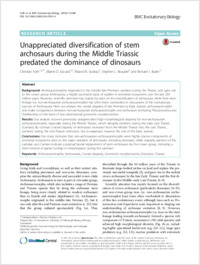Unappreciated diversification of stem archosaurs during the Middle Triassic predated the dominance of dinosaurs
- Foth, Christian Department of Geosciences, University of Fribourg, Switzerland - SNSB, Bayerische Staatssammlung für Paläontologie und Geologie, München, Germany - Department of Earth and Environmental Sciences and GeoBio-Center, Ludwig-Maximilians-Universität, München, Germany
- Ezcurra, Martín D. CONICET, Sección Paleontología de Vertebrados, Museo Argentino de Ciencias Naturales, Buenos Aires, Argentina - School of Geography, Earth and Environmental Sciences, University of Birmingham, UK
- Sookias, Roland B. School of Geography, Earth and Environmental Sciences, University of Birmingham, UK
- Brusatte, Stephen L. School of GeoSciences, University of Edinburgh, UK
- Butler, Richard J. School of Geography, Earth and Environmental Sciences, University of Birmingham, UK
-
15.09.2016
Published in:
- BMC Evolutionary Biology. - 2016, vol. 16, p. 188
English
Archosauromorpha originated in the middle–late Permian, radiated during the Triassic, and gave rise to the crown group Archosauria, a highly successful clade of reptiles in terrestrial ecosystems over the last 250 million years. However, scientific attention has mainly focused on the diversification of archosaurs, while their stem lineage (i.e. non- archosaurian archosauromorphs) has often been overlooked in discussions of the evolutionary success of Archosauria. Here, we analyse the cranial disparity of late Permian to Early Jurassic archosauromorphs and make comparisons between non- archosaurian archosauromorphs and archosaurs (including Pseudosuchia and Ornithodira) on the basis of two-dimensional geometric morphometrics.Results: Our analysis recovers previously unappreciated high morphological disparity for non- archosaurian archosauromorphs, especially during the Middle Triassic, which abruptly declined during the early Late Triassic (Carnian). By contrast, cranial disparity of archosaurs increased from the Middle Triassic into the Late Triassic, declined during the end-Triassic extinction, but re-expanded towards the end of the Early Jurassic.Conclusions: Our study indicates that non-archosaurian archosauromorphs were highly diverse components of terrestrial ecosystems prior to the major radiation of archosaurs, including dinosaurs, while disparity patterns of the Ladinian and Carnian indicate a gradual faunal replacement of stem archosaurs by the crown group, including a short interval of partial overlap in morphospace during the Ladinian.
- Faculty
- Faculté des sciences et de médecine
- Department
- Département de Géosciences
- Language
-
- English
- Classification
- Palaeontology
- License
-
License undefined
- Identifiers
-
- RERO DOC 277681
- DOI 10.1186/s12862-016-0761-6
- Persistent URL
- https://folia.unifr.ch/unifr/documents/305092
Statistics
Document views: 160
File downloads:
- pdf: 215
